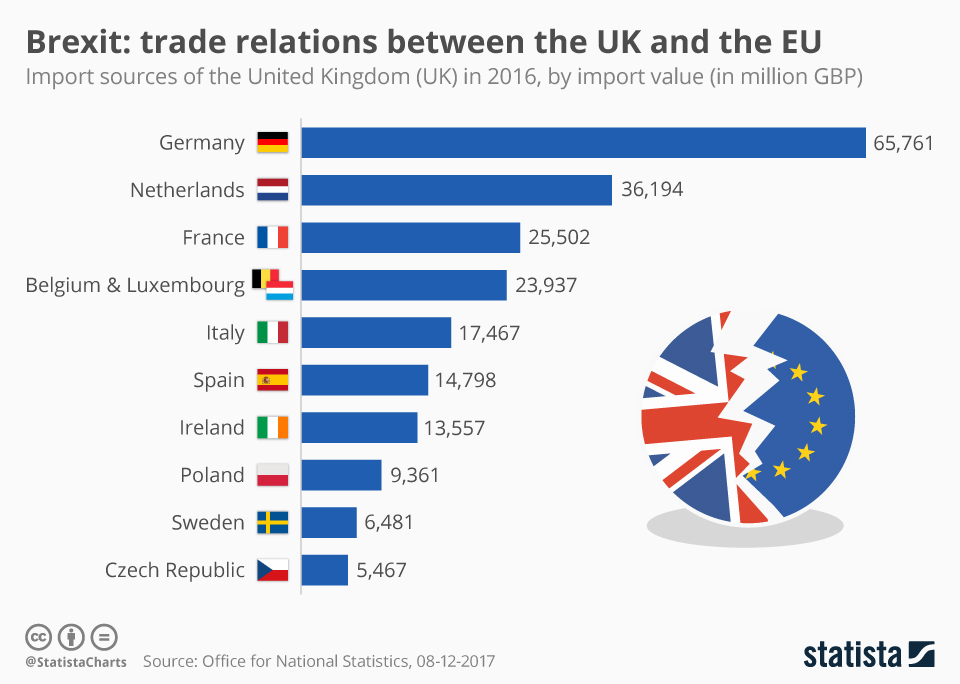Brexit Damage: BOE's Bailey Advocates For Enhanced EU Trade Relations

Table of Contents
The Economic Fallout of Brexit
Brexit's impact on the UK economy has been multifaceted and significant. The resulting damage is evident across several key areas.
Reduced Trade Volume
Since Brexit, trade between the UK and the EU has plummeted. Numerous reports from organizations like the Office for National Statistics (ONS) highlight this dramatic reduction.
- Specific sectors affected: The agriculture and automotive sectors have been particularly hard hit, experiencing significant drops in exports to the EU.
- Statistics illustrating the drop: Data reveals a double-digit percentage decline in both exports and imports compared to pre-Brexit levels. (Specific figures should be inserted here from reliable sources like ONS reports).
- Trade barriers: New customs checks, increased paperwork, and tariffs have created significant barriers to trade, adding costs and delays for businesses.
Supply Chain Disruptions
Brexit has significantly complicated UK supply chains, leading to increased costs and delays. This disruption has ripple effects across various industries.
- Examples of disruptions: Delays in the delivery of goods, shortages of essential components, and increased transportation costs are commonplace.
- Impact on businesses and consumers: Businesses face higher operating costs, impacting profitability and consumer prices. Consumers experience delays and higher prices for goods.
Investment Decline
Foreign direct investment (FDI) into the UK has declined significantly post-Brexit, hindering economic growth and job creation.
- Statistics showing decline: Data from the ONS and other reputable sources should be included to quantify the reduction in FDI.
- Impact on job creation and economic growth: Reduced investment translates to fewer job opportunities and slower economic expansion.
Bailey's Call for Enhanced EU Trade Relations
Facing these challenges, Andrew Bailey and the BOE have advocated for a significant improvement in UK-EU trade relations.
Specific Proposals
While specific proposals might evolve, Bailey's overarching message consistently emphasizes closer collaboration with the EU.
- Suggested policy changes: This could include streamlining customs procedures, reducing non-tariff barriers, and exploring new regulatory cooperation mechanisms.
- Potential negotiations and agreements: The BOE may advocate for renewed negotiations to address existing trade friction points.
Rationale Behind the Recommendations
The economic reasoning behind Bailey's call for stronger ties is clear.
- Benefits of increased trade: Increased trade with the EU would boost economic growth, create jobs, and potentially reduce inflation by improving supply chain efficiency.
- Closer collaboration on regulatory issues: Harmonizing regulations where possible would significantly reduce trade barriers and facilitate smoother cross-border trade.
Challenges and Obstacles
Improving UK-EU trade relations faces significant political and practical challenges.
- Potential disagreements and points of contention: Differing approaches to regulatory standards and market access remain points of friction.
- Political hurdles: Political sensitivities surrounding Brexit continue to impact the possibility of closer cooperation.
Alternative Strategies and their Limitations
While enhanced EU trade relations are crucial, other strategies are also being explored to mitigate Brexit's damage.
Focus on Other Trade Deals
The UK government is actively pursuing trade agreements with countries outside the EU.
- Examples of trade agreements: Agreements with various countries are being negotiated and implemented. (Specific examples should be mentioned here).
- Potential to offset losses: While these agreements hold promise, their potential to fully compensate for the loss of EU trade remains uncertain.
Internal Market Reforms
Internal market reforms within the UK are also being considered.
- Examples of potential domestic policy changes: These might include targeted investment in specific sectors or streamlining domestic regulations.
- Effectiveness in addressing Brexit consequences: Internal reforms alone are unlikely to fully address the significant economic consequences of reduced EU trade.
Conclusion: Mitigating Brexit Damage Through Enhanced EU Trade Relations
The economic damage caused by Brexit is substantial, and the BOE's concerns are well-founded. Strengthening UK-EU trade relations is a crucial step towards economic recovery. Andrew Bailey's advocacy for improved cooperation highlights the urgent need to address the lingering Brexit damage. Understanding the extent of Brexit's economic impact and the potential benefits of improved EU trade relations is crucial. Stay informed about the latest developments and advocate for policies that foster stronger economic ties with the EU. For further information, refer to reports from the Bank of England and the Office for National Statistics. Improving EU trade is vital for mitigating Brexit's ongoing negative effects.

Featured Posts
-
 March 26th Remembering Prince And The Fentanyl Overdose Report
May 31, 2025
March 26th Remembering Prince And The Fentanyl Overdose Report
May 31, 2025 -
 Daily Press Almanac Your Source For News Sports And Jobs
May 31, 2025
Daily Press Almanac Your Source For News Sports And Jobs
May 31, 2025 -
 Understanding Molly Jongs How To Lose Your Mother A Quick Review
May 31, 2025
Understanding Molly Jongs How To Lose Your Mother A Quick Review
May 31, 2025 -
 Ai And The Illusion Of Learning Guiding Principles For Ethical Use
May 31, 2025
Ai And The Illusion Of Learning Guiding Principles For Ethical Use
May 31, 2025 -
 Netflixs Black Mirror 5 Real World Parallels To The Dystopian Series
May 31, 2025
Netflixs Black Mirror 5 Real World Parallels To The Dystopian Series
May 31, 2025
